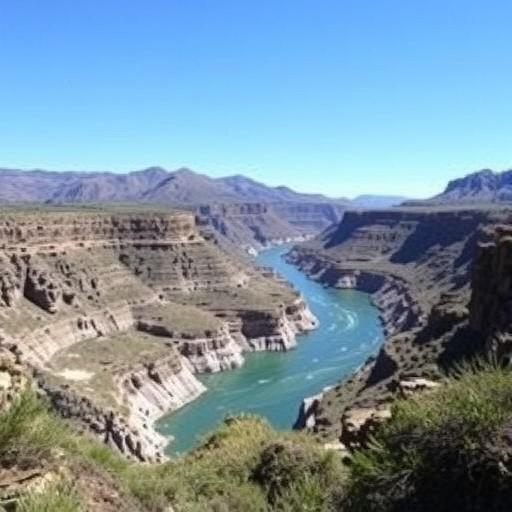In a world increasingly defined by water scarcity and environmental uncertainty, a groundbreaking scientific breakthrough offers a glimmer of hope for sustainable groundwater management. Recent research has documented an unprecedented large-scale recovery of aquifers, achieved through deliberate human intervention. This discovery comes at a crucial time, as over-extraction and contamination have led to declining aquifer levels globally, threatening food security, drinking water supplies, and ecological health. The study highlights how targeted human actions can reverse these trends and restore critical underground water reserves on a grand scale, heralding a new era in hydrogeology and environmental stewardship.
The research focuses on understanding the complex dynamics of aquifers—underground layers of permeable rock or sediment that store groundwater—and how anthropogenic activities can help replenish them effectively. Traditionally, groundwater depletion has been seen as largely irreversible without natural replenishment from rainfall or surface water. However, this new study overturns previous assumptions by demonstrating that strategic human interventions can lead to measurable and sustained aquifer recovery, even in regions previously deemed severely depleted.
At the core of this achievement lies a multifaceted approach combining advanced hydrogeological modeling, precision monitoring, and engineered recharge techniques. These include artificial recharge basins, enhanced infiltration of treated wastewater, and managed aquifer recharge (MAR) systems that optimize water percolation into underground reservoirs. Through meticulous data collection and simulation, scientists have been able to tailor interventions to local geological and climatic conditions, maximizing recharge efficiency while minimizing environmental impacts.
One of the key revelations of the study is the scale at which aquifer recovery can be accomplished. Unlike prior pilot projects limited to small sites, the current intervention spans an extensive geographic region, encompassing multiple aquifer systems across diverse terrains. This scale presents unique challenges, from coordinating stakeholder interests to integrating cross-sectoral policies. Yet, by fostering collaboration between hydrologists, engineers, policymakers, and local communities, the project delivers proof that large-scale groundwater restoration is achievable.
The researchers also emphasize the importance of continuous monitoring and adaptive management. Using state-of-the-art sensing technologies—such as remote sensing, groundwater well sensors, and geochemical tracers—the team has been able to track aquifer levels, water quality, and recharge rates in near real-time. This information allows for dynamic adjustments in recharge strategies to respond to shifts in seasonal precipitation, land use changes, and water demand. Such data-driven approaches contrast sharply with traditional static water management plans, which often fail to respond to evolving hydro-environmental conditions.
Beyond the environmental and technical aspects, the human dimension of aquifer recovery plays a crucial role. Public awareness campaigns and regulatory frameworks ensure that water conservation practices complement recharge efforts. Incentives for water users to reduce consumption, combined with strict controls on groundwater extraction licenses, help sustain the positive gains achieved through recharge interventions. This holistic approach underscores the need for integrating social, economic, and environmental objectives in tackling water scarcity challenges.
The implications of this research extend far beyond the immediate sites of intervention. Groundwater serves as a vital backup resource during droughts, and its depletion exacerbates climate vulnerability. Successfully restoring aquifers enhances the resilience of water supply systems, supports agricultural productivity, and protects dependent ecosystems. Moreover, aquifer recovery can mitigate land subsidence issues caused by groundwater extraction, reducing infrastructure damage and safeguarding communities.
Importantly, this breakthrough aligns with global sustainable development goals, particularly those targeting clean water access and climate action. By demonstrating that human ingenuity can not only halt but reverse aquifer depletion, the study provides a replicable model for other regions facing similar hydrological stresses. Governments and water managers worldwide can draw valuable insights from this approach to implement effective recharge strategies suited to their unique contexts.
Nonetheless, the researchers caution that aquifer recovery is no silver bullet. The success documented requires careful planning, substantial investment, and long-term commitment. Water quality concerns must be rigorously managed to prevent contamination during recharge. Additionally, climate change introduces uncertainties such as altered precipitation patterns and increased evapotranspiration that could influence recharge feasibility. Therefore, flexible and adaptive frameworks are essential to sustain aquifer health amid shifting environmental conditions.
Scientifically, the work challenges existing paradigms by integrating geological, hydrological, chemical, and socio-economic variables into a unified framework. This interdisciplinary methodology advances our understanding of subsurface water dynamics and the practical levers available for intervention. It paves the way for further innovation in hydrogeology, including predictive modeling, biogeochemical analysis, and the design of novel recharge infrastructures.
Furthermore, the societal benefits of large-scale aquifer recovery are profound. Enhanced groundwater availability reduces reliance on expensive desalination or long-distance water transfers. It supports livelihoods, food security, and ecosystem services, especially in arid and semi-arid zones where surface water resources are scarce. By securing a stable groundwater supply, communities can better withstand drought cycles and climate-induced shocks, contributing to social stability and economic development.
In conclusion, this landmark study dispels the notion that groundwater depletion is an irreversible crisis. By harnessing modern science and conscientious human intervention, it demonstrates that aquifers—hidden beneath our feet—can be replenished at scales hitherto unimaginable. The research offers a beacon of hope and a blueprint for sustainable water management in a world grappling with climate uncertainty and resource stress. Moving forward, expanding and adapting these intervention strategies could help ensure that future generations inherit a more resilient and abundant water future.
Subject of Research: Groundwater aquifer recovery and sustainable management through human intervention.
Article Title: Unprecedented large-scale aquifer recovery through human intervention.
Article References:
Long, D., Xu, Y., Cui, Y. et al. Unprecedented large-scale aquifer recovery through human intervention. Nat Commun 16, 7296 (2025). https://doi.org/10.1038/s41467-025-62719-5
Image Credits: AI Generated




